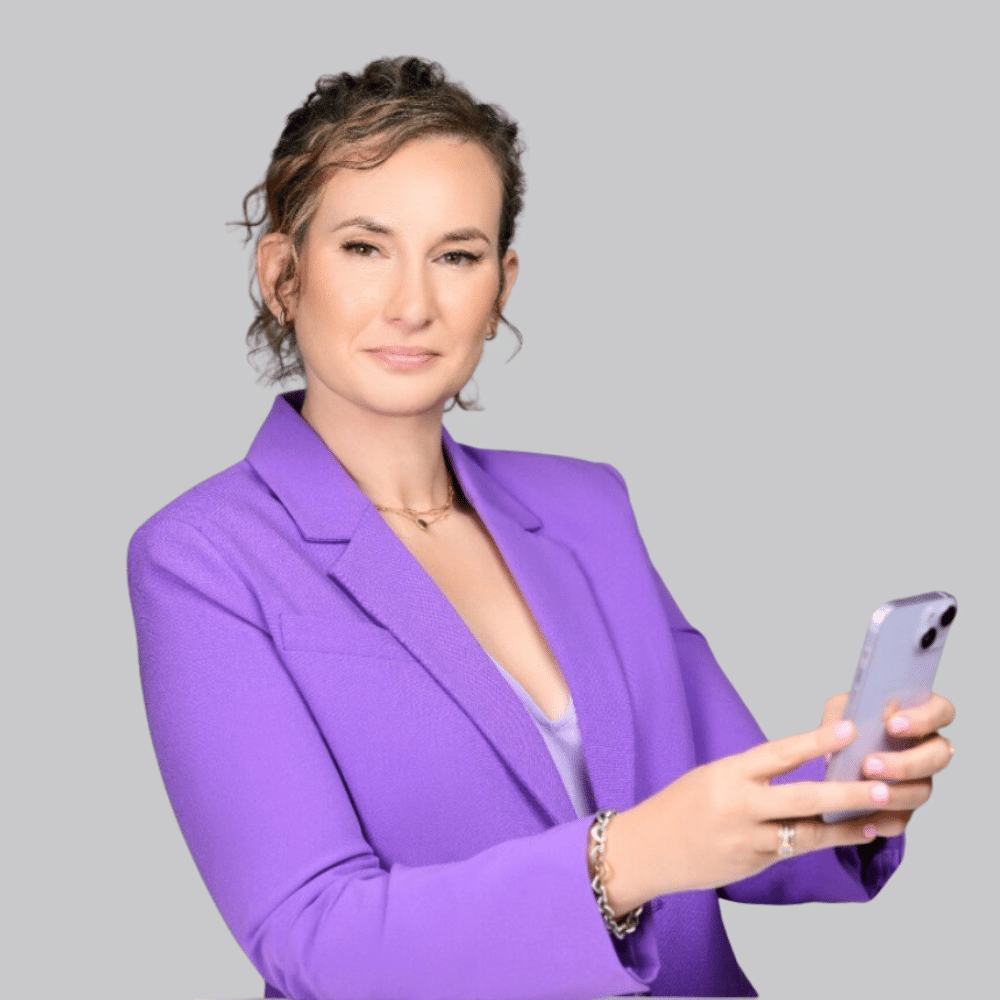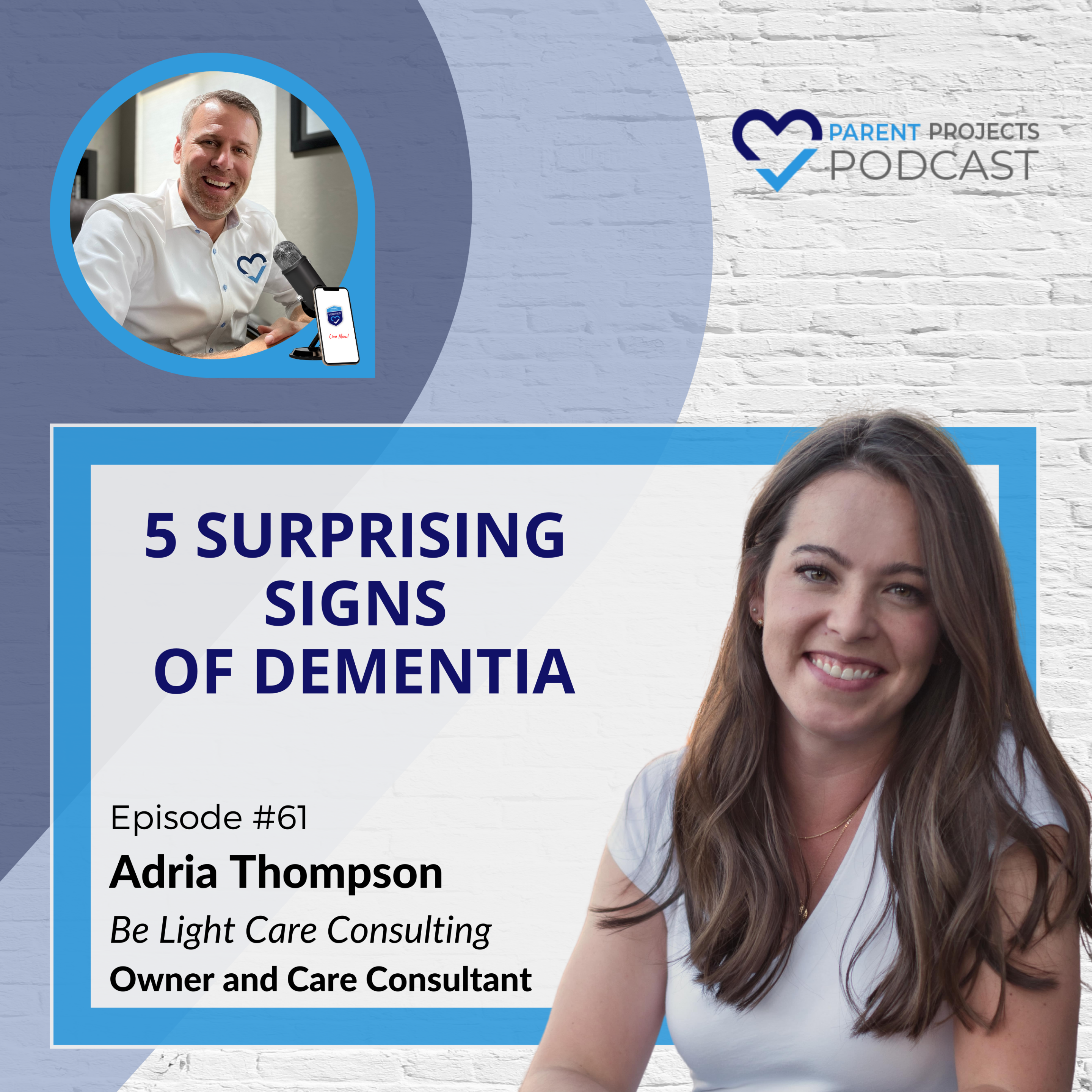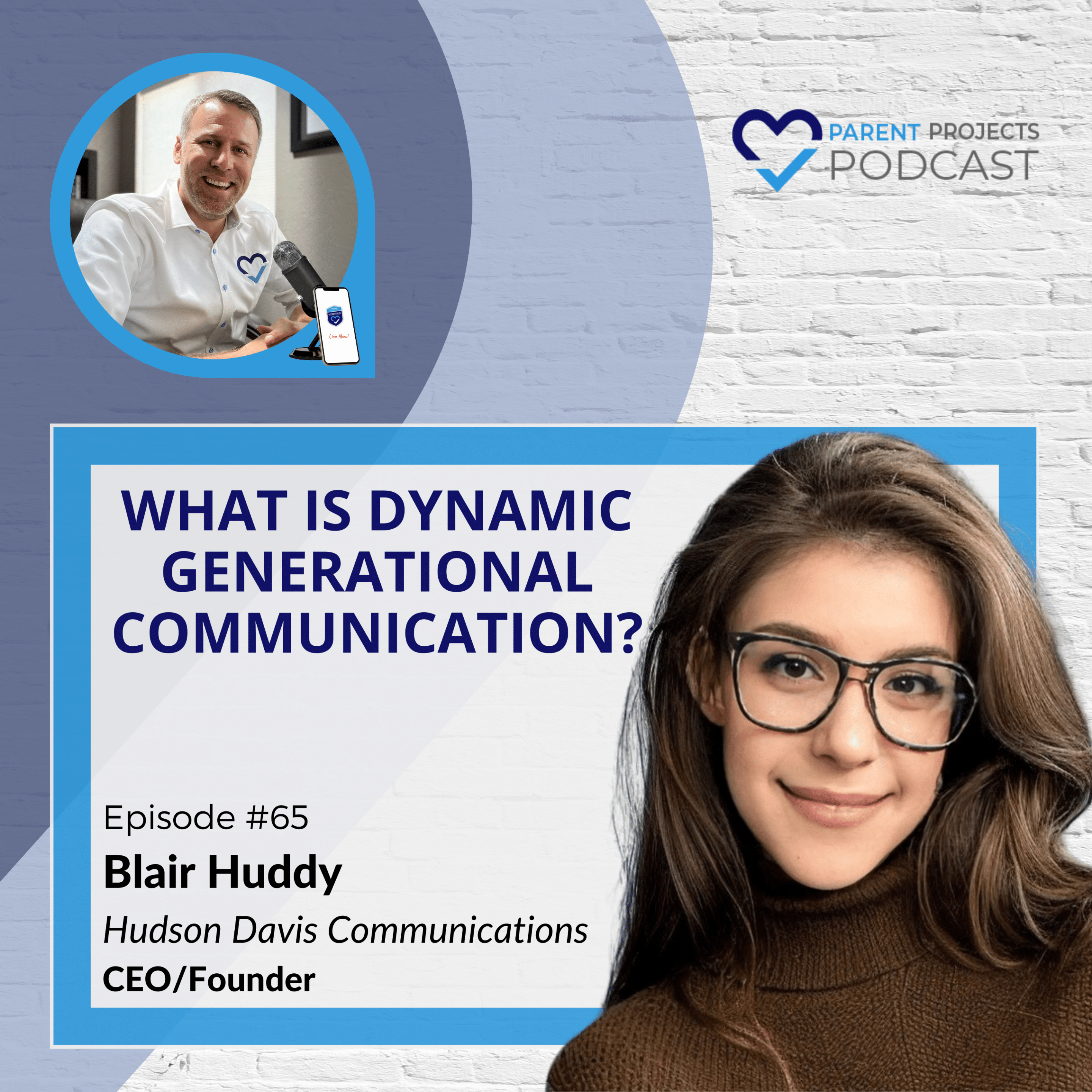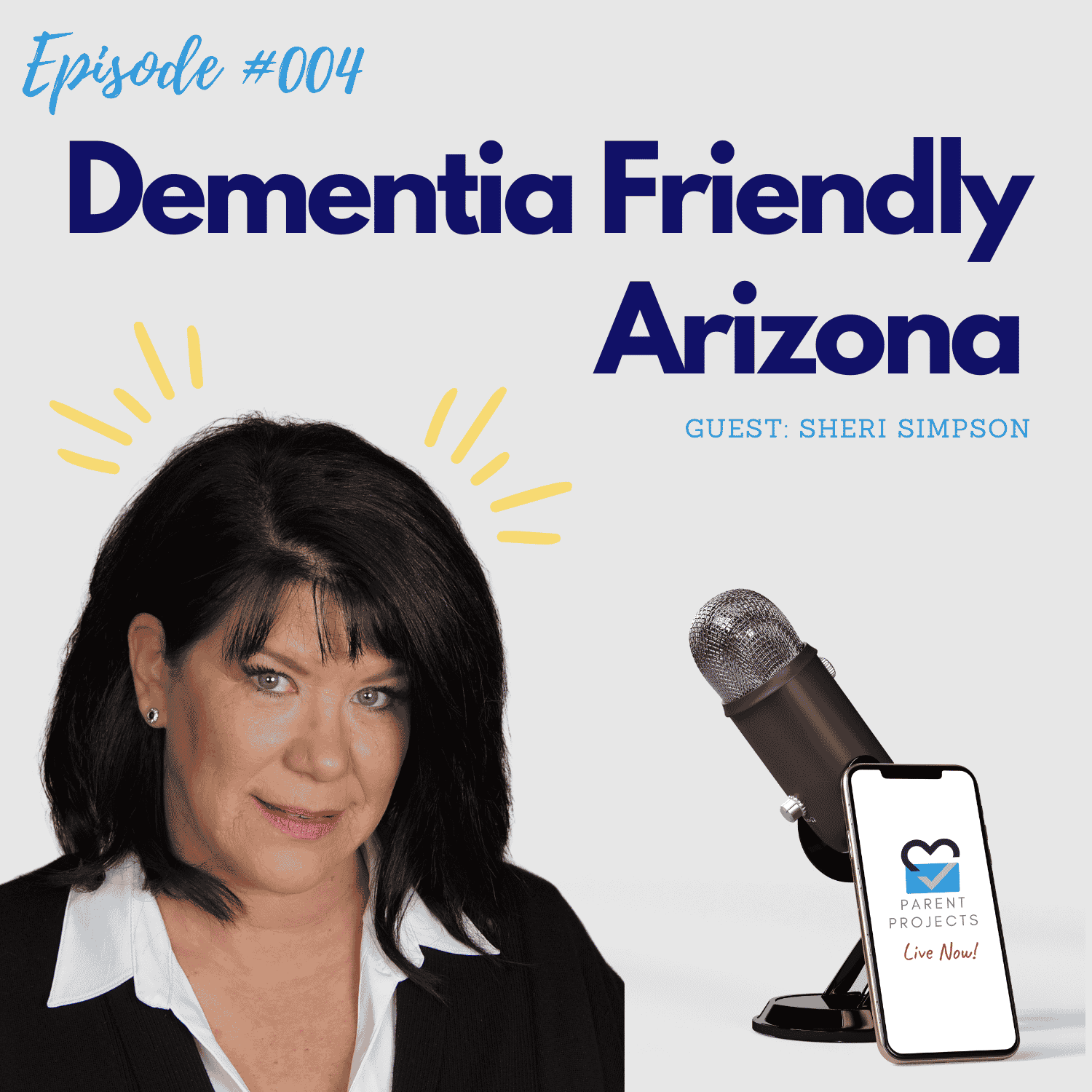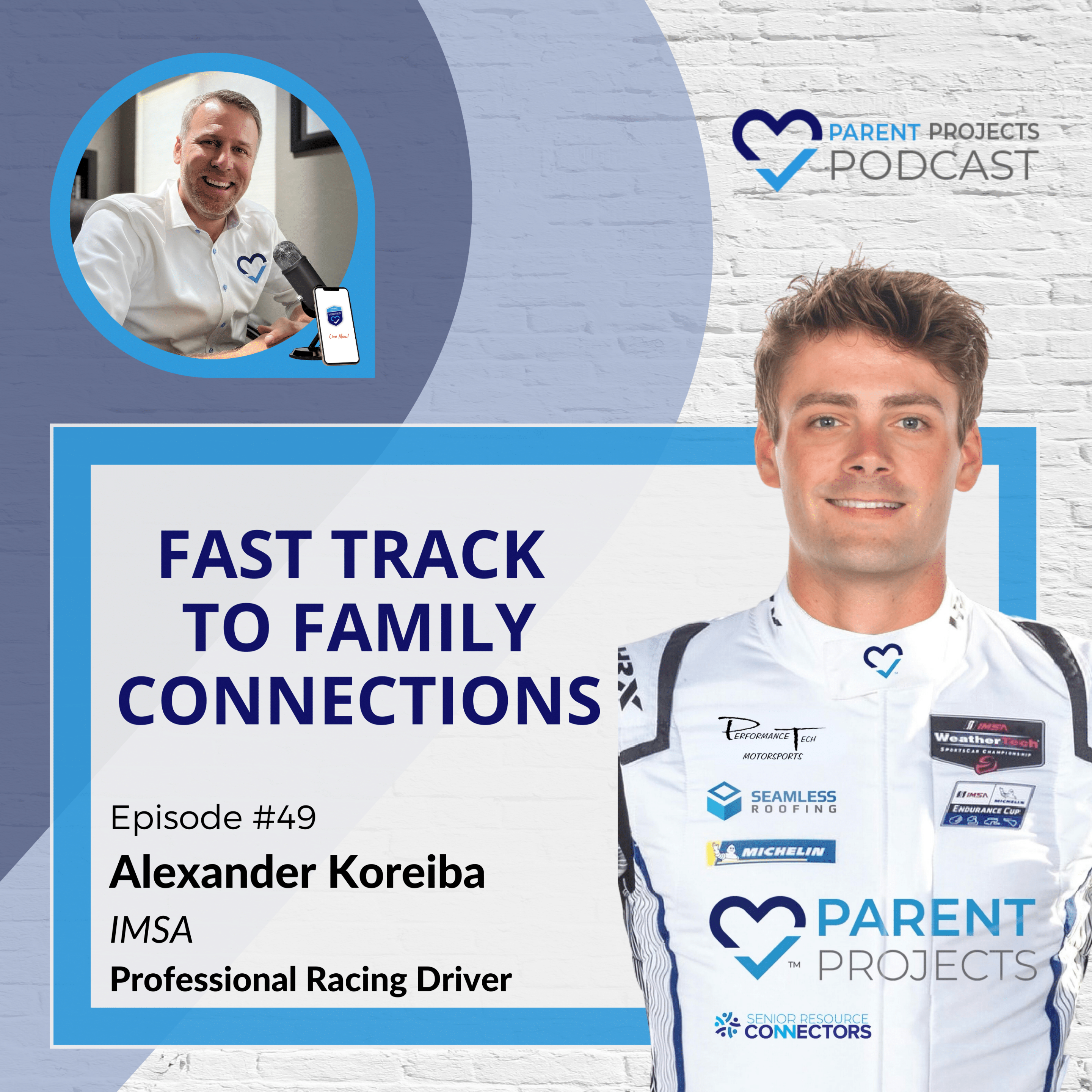[00:00:00] Speaker A: Well, it's difficult, you know, because if someone is experiencing this impulsivity or what we also might call disinhibition or inability to, like, inhibit or hold back bad decisions or choices that they make, they also will likely experience what's called ana zignosia, which is the inability to be aware of your own deficits. And that's that the reason why and impulsivity and all of these things happen usually as a bundle, is because those are all parts of the frontal lobe of the brain. So if a disease has gotten to that part of the brain, then all of those things can be affected.
[00:00:41] Speaker B: As our parents grow older, it can be difficult to guide them through their golden years while still respecting their autonomy and fitting it into our already complex lives. Welcome to the Parent Projects podcast, where our guests share practical wisdom to tackle the issues that impact adult children of aging parents. I'm Tony Siebers. Thanks for joining us today.
[00:01:07] Speaker C: Really excited to have everybody in this week. As we talk about in this series of new normals, we bring in front of the show Adria Thompson, who is a language pathologist, certified dementia specialist, a trainer. She is genuinely a go to for me. You've probably noticed in a lot of stuff that we do, many of the things that she says, how she resonates have been something that have helped my family personally deal with the identification of dementia and how we handle those moments when they come up so we could find joy in the years and what we have. So, hey, Adria, thanks for joining us. We're going to jump right into having you on. Thanks for being here this week.
[00:01:45] Speaker A: Hi, Tony. Thanks for having me. It's so good to be back.
[00:01:48] Speaker C: It's awesome to have you back. So within the context of today, I guess we're going to talk about some of these things that these surprising signs the dementia is coming up. Could you maybe start with this real quickly in that background? Obviously, we know you come at this from a language pathologist standpoint and you started getting, and you started studying a bit and starting understanding dementia and how that unfolded. Can you give us for those audience that's not as familiar with you, what is that call, what is it that's got you focusing your time, talents and treasures on dementia and families that are struggling with that right now?
[00:02:25] Speaker A: Yeah. So I was never a person who knew what I wanted to do for the rest of my life, but I did know about myself that I love teaching. I love making complex ideas simple. And I see that just played out many times throughout my life back in high school, through college, and even just in my personal relationships with friends. And so when I was in college, I started to explore the area of speech language pathology, and I was all in. I loved the idea. For many of you who might not know, speech therapy, speech language pathology, it's the same term, so I might use those interchangeably. But speech therapy we might think about with children who can't say they're ours, which I was actually one of those kids. I had speech therapy myself. But speech therapy is more than just that. It's about communication all across the lifespan. And when I started working in my grad school practicum, I was getting hands on experience. I really resonated, really enjoyed working with the most complex people, the people who others had given up on that maybe didn't have the skills to advocate for themselves, that people had passed over time and time again. And I saw that with children with severe disabilities, but also with individuals with dementia. And so I started my career working in a nursing home as a speech therapist there, and I just fell in love with individuals with dementia. My energy level, my introvertedness, lent well to working one on one with people with dementia, as opposed maybe to the more energetic children.
So that was just really an easy connection there. But then as I started realizing that many people didn't understand dementia, I realized I could use my skills and that joy I have of teaching other people complex things in a simple way. And so it just kind of unfolded from there. My grandmother then was diagnosed with dementia, so it became very personal to me. And so I feel very blessed in the fact that I feel like I'm definitely living out my purpose. What I'm doing maximizes my strengths. Boy.
[00:04:33] Speaker C: And that clearly shows, I mean, the joy you have to be able to cover such a difficult thing is it's contagious. When you watch one of the videos and maybe you're talking through something in be light consulting or be like, care on social media, I'll notice you'll tackle something like dealing with somebody who doesn't want to take a shower or just these real problems that are really frustrating in the moments in which they tackle and you handle them with such joy. It genuinely gives off hope. So, I mean, kudos to you again, I love having you on the show every time we can get you.
I am really looking forward to diving into this topic specifically. There have been things that we've talked about before and to make it really clear sometimes dementia and forgetfulness, maybe there's been an injury or something's happened, hospitalization and it might set in really quickly, but in general, I'm really interested to see some surprising signs that dementia might be at play. And then maybe, as we kind of wrap up on the backside of that, talk about, well, what do you do if you're seeing one of those quick things? Just a couple of quick ideas for people to get started just around the barn. So let's dive right in. Let's start. What is your top. What is the first one that we should be thinking about with a surprising sign?
[00:05:55] Speaker A: So, as you mentioned, memory loss is typically what we think of when we think of symptoms of dementia. But it's really important to know that memory loss is not the only symptom. And for many people, it doesn't exist until well into the disease. And that's because there are many types of dementia. So I'm going to tell you five surprising signs of dementia, and the first one is related to memory loss. So maybe that's not too surprising, but the way that it shows itself is surprising. So in order to explain this, I'm going to give you a phrase to remember. It's called last thing in, first thing out. Okay. So when we apply this to dementia, we see this early in the disease for many people, to where the last thing that they have experienced or that they have learned will be the first thing that they forget. Now, we see this very obviously in two areas, and the first is technology, right? So if we look over a person's lifespan and pieces of technology that they're comfortable with and that they've learned, maybe first was the television, and then it was a microwave, and then it was a car, and then it was like an actual telephone, and then it was a cell phone. And just most recently, they learned to stream on their, know, Netflix or Hulu or something. So if we apply the concept of last thing in, first thing out, then what happens is if someone experiences memory loss, usually the first thing they forget is going to be those streaming devices. So you're going to get calls from mom or dad saying, the tv is broken. I don't know what happened. The remote's not working. You need to come over here and fix it. And you get there and then what happens? Yeah, everything works.
No, it's an operator error. You're not using it correctly. And so that might become an issue. You realize, hey, you know what? Let's forget it. We're not going to worry about that. We'll just get cable box and you can go back to what you're comfortable with. And then the next thing is the cell phone's broken. I don't know what's happened. My phone's broken. You need to take me to the store. I need to get it fixed. And so sometimes it's actually the exact order that they've learned a piece of technology. You'll see the opposite being forgotten if you kind of lay it out. Isn't that so interesting?
[00:08:13] Speaker C: It's completely fascinating. And particularly one way that I've watched families struggle with this is even if they've recognized that and decided, okay, well, we can't handle a streaming service that we're using off of your streaming television. We're going to go back to cable. Cable is also picking up technology, so they've changed from nothing. Is the simple clicker channel up, channel down, volume up, volume down. Even they have got an onboard menu because traditionally they're working to keep up with everybody else with the other applications there. So that becomes a challenge, and you feel like you're kind of in a fit for it. But the importance of what we're saying here is just that peeling back of the last thing in and the first thing out. Got it?
[00:09:00] Speaker A: Yeah. And so I said there were two main things we see, and the second is a little less light hearted. And sometimes that's people. Right. So the people that have entered their life most recently might be the first people that they forget. So they might really struggle with a great grandchild's name because they're the person that has entered their world most recently, and then maybe the spouse of a grandchild, like their name. And so we can kind of almost work backwards as to who has most recently entered their life. We might see that they forget those people in that order. There's always exceptions, of course, but that's kind of a surprising thing sometimes. It's not only that people, oh, they just forget things, but consider what order they're actually forgetting things.
[00:09:40] Speaker C: That's fantastic. Okay, number two.
[00:09:44] Speaker A: Number two would be a language impairment. So when I say language, I don't just mean like, oh, they forget the english language, but its language is receptive language and expressive language. So if we look under the umbrella of expressive language, that's where we see talking, right? That's expressing ourselves verbally. That is usually what we think of when it comes to communication, but also with expression, we see writing. So sometimes people can have difficulty with thinking of the words they want to say. When they go to say something, it comes out maybe jumbled, or when they write, it's not as clear as it used to be. They also might have difficulty with receptive language, and under that umbrella comes reading. So understanding what they're reading on paper, but then also comprehension of language of other people. So when other people are talking, having a difficult time understanding. And so as people get older, we know that hearing loss is more. There's a higher risk of hearing loss. Right. As you get older. And so sometimes what we see is that someone who is older might say, what? What did you say? I didn't understand you. I can't hear you. And then you take them to an audiologist, and their hearing might be okay. Or maybe it's the same way it's always been.
It's possible that that person, instead of having a difficult time hearing, you might have a difficult time understanding what they're hearing. And so language, having difficulty with any of those pieces of language can be a first sign of certain types of dementia.
[00:11:25] Speaker C: Okay, that's great.
Where does the form is music or expressing with things like that? I know that might be a wrench against what we're looking for and a great conversation to follow up on, but music seems to handle differently or to kind of work differently. And you're the master of language, and it is a beautiful language. So what are your thoughts to that?
[00:11:51] Speaker A: Yeah, no, that's actually a great question, because sometimes we might hear differences in someone's ability to just verbally talk, but their ability to sing or to follow along with music is the same. But that is because music is more of a global task in our brain. So when we talk about our brain, there's many different lobes of the brain, but when we say global, that means that we're going to use most or if not all of our brain. And so when we have tasks that are global that uses many different parts of the brain, we can typically be more successful for longer, because if one little tiny spot in the brain is having damage because there's so many other parts, it can compensate. So music is one of those things. It's not just language. It's rhythm, it's long term memory. Right. It's reminiscing from repetition over and over and over again. And so it's movement. And so because music is global, it's not affected in the same way as spoken languages. And for many people, actually, who have had a stroke, who have difficulty with communication, who have a deficit in one very specific part of the brain, as a speech therapist, if I were to work with them, I would use music to stimulate that language. So it actually is a great compensatory strategy to use music to stimulate language.
[00:13:17] Speaker C: Fantastic. Okay. I threw a wrench into the middle of that one. How about number three?
[00:13:22] Speaker A: All right, number three. Number three is something called instrumental activities of daily living. So, instrumental activities of daily living, or sometimes it's referred to as iadls, are the really complex thinking tasks that we do on a daily basis. Might be things like paying bills. Right. That requires calculation, problem solving, timing, memory, driving. That requires a lot of cognitive energy, cooking, medication management. All of those skills require a lot of your brain to do. And so we will often see instrumental activities of daily living suffering before we see other things happening. So what that might look like, especially maybe if you are someone who just works out in the community, you might have a customer come in, and when they go to pay their bill, maybe at a restaurant, they hand you their cash, and they say, you just pay what you need, or you tell me how many dollars you need. Or maybe when they're writing a check, they write the things in the wrong spaces, or they have difficulty maneuvering, once again, the piece of technology that it requires to use a credit card. And so that might be a sign that someone is struggling with those more complex tasks of using those kinds of skills. And so we will see people get behind on bills. Maybe they pay too much. My parents own a business, and they sell furniture and appliances, and so many of them are on payment plans. And so there will be times where someone will come in and try to pay again for something that's already been paid off, and that could be a sign that something is going on with someone's brain that might not just be normal aging.
[00:15:18] Speaker C: Yeah, I definitely have seen firsthand whatever the bill comes in, they'll hand a $20 bill. Their go to will be a $20 bill or a $10 bill. Right. To cover whatever that was. And just expecting that change to kind of come back as a coping mechanism. And that has become more and more challenging as inflation set in and things got more expensive. And it's more often they're not able to cover it with the first bill that they're used to putting down than what was working before.
[00:15:48] Speaker A: It's a good point.
[00:15:50] Speaker C: It just kind of caught everybody off guard where we wouldn't have missed that. So. Fantastic. Love that. Okay, instrumental adls number four.
[00:15:59] Speaker A: Number four. Now, this really sounds unusual, but I'll explain sleep disturbances. Okay, so, there's a type of dementia called Lewy body dementia, and it is very closely related. It's caused by the same symptoms in the brain as Parkinson's disease. So individuals with lewy body dementia, and sometimes with Parkinson's disease, will start to show what's called an REM sleep behavior disorder. There's a lot of acronyms there. So REM is rapid eye movement. And so that's the part of our sleep pattern where we are most active in our dreams. We are dreaming really vividly. And what happens for someone who's neurotypical, who doesn't have any kind of dementia, we will usually produce a hormone in our brain that paralyzes our body, and that is solely to protect us. So as we're running down the halls of our middle school, being chased by a tarantula, maybe in our dream, we are paralyzed physically so that we don't act out those movements and injure ourselves or the person that's in the bed with us.
[00:17:13] Speaker C: Sure.
[00:17:13] Speaker A: For individuals with REM sleep behavior disorder, they don't produce that hormone anymore, and so they do act out their dreams. And so this can be something that happens actually years before any other cognitive symptoms. And a person just thinks, oh, I'm just not sleeping well. I'm being fitful. I'm really stressed. Or maybe we might label these people as falling out of bed or rolling out of bed, and we think that they're just kind of like a baby just falling off the side, but really they're propelling themselves out of bed. And so it's very interesting to see those kind of sleep disturbances and sometimes how that can develop later on down the line.
[00:18:00] Speaker C: That is fascinating and what a great thing to understand and to be able to see, especially if you can see where somebody's sleeping or when that is.
Okay, fantastic. Okay, hit me with number five.
[00:18:15] Speaker A: All right. The fifth and final one would be difficulty with judgment and safety awareness. So what this might look like is if someone is becoming more impulsive. This is very subjective and difficult to determine because, let's say someone, a man, 65 years old, all of a sudden just decides to quit his job, divorce his wife, buy a sports car, develop a gambling addiction. And often other people might see this person and think, well, he needs Jesus, right? Like, he needs to go to church. He needs a good whooping or whatever it.
So I can't believe he's acting like that. But there are some types of dementia, specifically frontotemporal dementia, which can cause someone to act impulsively, and they can't help it. So they no longer have sound minds. They don't have the judgment or ability to reason and make safe or good decisions anymore. And so that is often, as you can imagine, misdiagnosed or mislabeled as maybe a midlife crisis, when really it's a neurological disease. It's a type of dementia.
[00:19:34] Speaker C: Well, and that tends to speak to something you've said. Often when someone's doing something, if they have dementia and they do something that's off the wall, it's because it makes sense to them.
I think you have to really absorb that in watching those behaviors in the first place to say, okay, well, yeah, this makes sense to them. So therefore, this is really an impairment and what you drive through. So when you see a judgment or a safety impairment or something like that is coming about, let's talk about what are some of the early responses to help you gauge the difference between that and maybe it's a legitimate. Well, I don't know if that's a legit. If midlife crisis is a legitimate thing.
[00:20:18] Speaker A: Right. It could just be a phase. Right.
Well, it's difficult, because if someone is experiencing this impulsivity or what we also might call disinhibition or inability to inhibit or hold back bad decisions or choices that they make, they also will likely experience what's called ana zignosia, which is the inability to be aware of your own deficits. And the reason why anaxynosia and impulsivity and all of these things happen, usually as a bundle, is because those are all parts of the frontal lobe of the brain. So if a disease has gotten to that part of the brain, then all of those things can be affected. So if someone is not aware of their own deficits or of their own behavior, then it can be really difficult to get them to agree to see a neurologist, for example. Sure.
To answer that question, it's not easy. It's not easy. But I think if you can kind of take a holistic approach and say maybe you're not behaving like you were, maybe that can come better from a trusted friend versus a spouse or a child. Sometimes being strategic in who you get to initiate those conversations, that can make a big difference. You can also communicate with their primary care physician via messages or notes that can be outside of that conversation in the doctor's office.
That can feel kind of confrontational. But imaging and things like that can be really helpful to find the solution to whatever issue might be going on with them.
[00:22:07] Speaker C: Well, in medical science knows where to go from that. We're getting better and better at that every day. So I guess for our listeners that are out there, what we look for off of this was to find some surprising signs that you might be seeing something. But again, the compassion is to understand. It makes sense. Well, how does it make sense with them? These are five really great ideas as to how that comes through. That might explain why that activity or that action or what they're doing is making sense to what's going on in their life. And now we can start developing some kind of customized response as a family as to how to make that approach. And that is probably best set for one of our other episodes that we dive deep into in making those customized approaches from one side to the next. Adria. So can I try to recap those for you and see how I did my notes? Okay. Especially the first one coming in. You're giving me something to remember. I was getting ready. Oh, my gosh. Going to have to remember something.
Look, it was the last thing in, it was first thing out. Those things that we learned last often peel back first. And so that might be one thing that we're taking attention to. Technology and people are a couple of different components that that plays out within. We talked about number two, in language, both expressive in writing and receptive. So how it goes out, also how we receive that in a degradation of our ability to comprehend or maybe understand. And sometimes that might get mistaken even for hearing impairment or something else that sits in that direction. So if that didn't answer the mail, maybe we come back around to this direction. You went into instrumental adls or activities of daily living. Those seem to be more complex adls where I had to maybe put a couple of things together instead of just going to the bathroom and toileting myself. I've got to make a determination as to where I'm going to do a checkbook. So I've got to take a balance of one thing and then another balance of what's available, and then what tool do I use in order to pay that complication of putting those more advanced things that I do every day kind of into place is instrumental adls, sleep disturbances, really fascinating?
I had no idea that the reason that I stay still at night, I hope I do, but generally think I do, that that's something that is conditioned to help my body stay calm and protect myself. And as that peels back as a sign of dementia, or could be a sign of dementia, if I'm not able to do that, or if that's not happening properly and I find myself getting thrown out of bed, throwing myself out of bed, or my wife or a partner really noticing all of a sudden that we are just really manic or we're moving a lot would be a good thing to maybe tell mom to look for in dad or tell dad to keep an eye out for mom.
And then judgment or safety impairments, that quintessential something that might look like a midlife cris or just an inability to be aware of the struggles of bad decision after bad decision after bad decision and something made, not being able to pull those together. How do they do?
[00:25:20] Speaker A: Perfect. I'm so impressed. That's awesome. No, that's great. And I think if I were to sum it all up, all of those things is just looking for uncharacteristic changes, right? Because here's the thing. Whenever we identify these signs of dementia, there's always that, well, but mom's always been impulsive or, well, but dad has always had difficulty with paying bills. So if we were to just kind of give anyone an overarching view of these statements, it's just, is it uncharacteristic for them? And if it is, then I think that it's warranted to pursue maybe some medical assistance.
[00:25:59] Speaker C: I love it. Adria Thompson where can people find more information with you and be like care consulting?
[00:26:05] Speaker A: You can go to my website, belikecare.com. You can email me at
[email protected] or you can go to any social media platform, Instagram, TikTok, Facebook, and find me at care.
[00:26:19] Speaker C: And be prepared to handle something pretty difficult with a lot of joy when you do so because she is full of it, of just that light. And you really do. It's a great background. Love to having you on again. Adria, thank you so much for joining us and sharing your time, talents, and treasures with us and our listeners.
[00:26:37] Speaker A: It's been a pleasure. Thank you.
[00:26:44] Speaker D: Well, that's it for this team this week, and thanks for joining us. If you've enjoyed the content, remember to subscribe and to share this episode on the app that you're using right now. Your reviews and your comments, they really help us expand our reach as well as our perspectives. So if you have time, also drop us a note. Let us know how we're doing for tips and tools to clarify your parent project, simplify communication with your stakeholders, and.
[00:27:04] Speaker C: Verify the professionals that you choose.
[00:27:06] Speaker D: You can find us on YouTube. Follow us on Instagram and Facebook. Thanks again for trusting us until our next episode. Behold and be held.
[00:27:16] Speaker E: Thank you for listening to this parent projects podcast production. To access our show notes, resources, or forums, join us on your favorite social media platform or go to parentprojects.com.
This show is for informational and educational purposes only.
Before making any decisions, consult a professional credentialed in your local area.
This show is copyrighted by Family Media and Technology Group, Inc. And parent Projects, LLC.
Written permissions must be granted before syndication or rebroadcast.

